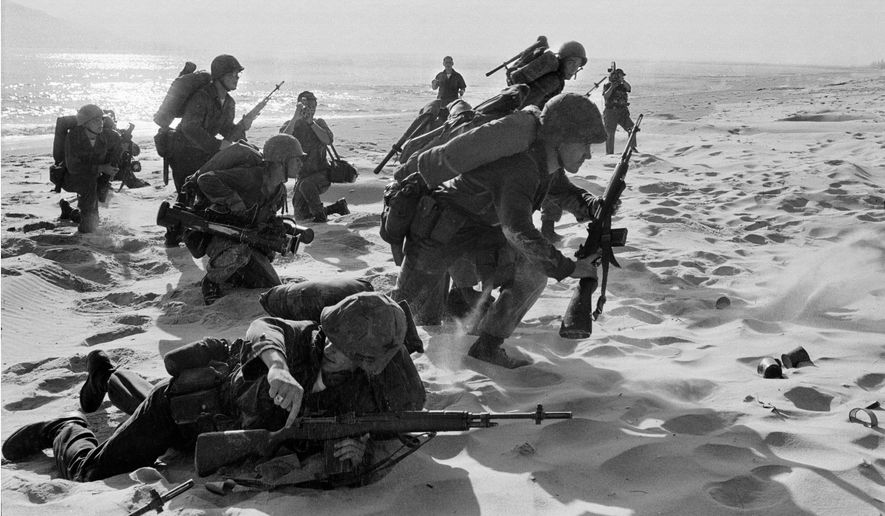OPINION:
There has been much publicity about recent Veterans Affairs (VA) bureaucrats manipulating data, the destruction of claim documents and other mismanagement that adversely affects the treatment of our dedicated veterans. However, these scandals pale in comparison to the VA’s arbitrary decision in 2002, with a basis in fact, to refuse benefits to U.S. Navy and U.S. Marine Corps veterans who were exposed to Agent Orange while serving in blue-water ships off the coast of Vietnam from 1962 to 1975.
The VA has chosen to ignore the congressionally mandated benefits for those veterans as outlined in the Agent Orange Act of 1991. Consequently, tens of thousands of Navy and Marine Corps veterans who have died or are dying from cancer and other deadly diseases contracted as a result of being exposed to Agent Orange have been cast side.
If the VA had just continued to implement the congressionally mandated 1991 Agent Orange Act, there would be no problem. The act specifically declared that any veteran who served on active duty in the Republic of Vietnam from 1962 to 1975 and has a disease attributed to Agent Orange dioxins would be “presumed to have been exposed to Agent Orange and eligible for service connected medical treatment and disability benefits.” The act applied to all veterans who earned the Vietnam Service Medal. This included all veterans who served on land; those who served in small craft on inland waterways (the brown-water Navy); and those who served on ships operating in harbors, bays or off the coast of Vietnam (the blue-water Navy) in the South China Sea.
Initially, Veterans Affairs properly executed the act by declaring that any Army, Navy, Marine Corps, Air Force and Coast Guard veteran who had earned the Vietnam Service Medal was presumed to have been exposed to Agent Orange and, therefore, eligible for treatment and benefits as necessary. However, for the past 13-plus years, the VA has limited Agent Orange-related benefits to only those who served “in country.” This arbitrary decision ignores abundant evidence that exposure to Agent Orange is seriously impacting those who served on Navy ships and who came into harbors, bays and within the territorial waters of Vietnam as well as further offshore.
There is no denying that U.S. military forces sprayed more than 20 million gallons of toxic herbicide and defoliants in Vietnam from 1962 to1971. The most common of these herbicides was known as Agent Orange, which contained high levels of Tetrachlorodibenzodioxin (TCDD) — one of the most deadly dioxins ever synthesized — causing cancers and other deadly diseases in humans. These deadly dioxins contaminated the land, rivers, harbors and bays, and were blown by prevailing winds far out to sea, where they were ingested by those on Navy ships.
While President Obama with his climate control initiatives may think he has stopped the oceans from rising, I know of no program that will stop toxic clouds at the water’s edge. However, the VA refuses to acknowledge that windblown Agent Orange was carried far out to sea. For a recent example that debunks the VA position, radioactive particles from the tsunami-damaged Japanese Fukushima nuclear reactor in 2011 covered the USS Ronald Reagan Battle Group operating 60 nautical miles off the coast of Japan.
The justification of the Agent Orange Act was borne out by several studies and periodic assessment by the Institute of Medicine. An initial Australian study in 2002 concluded that harbors, bays, territorial water and “offshore waters — out to 100 nautical miles” were contaminated with water runoff from inland areas sprayed with Agent Orange. Most importantly, shipboard seawater distillation plants actually enhanced the toxicity of the deadly Agent Orange “at least four times.” In other words, personnel on blue-water ships offshore drank, bathed in and had their clothing washed in water contaminated by deadly TDCC dioxins.
As further proof, in 2005 the Australian Department of Veterans Affairs published a cancer incidence study, which concluded that Royal Australian Navy personnel aboard ships during the Vietnam War had twice the rate of cancer as their Army veterans who served ashore. A 2009 Institute of Medicine report basically concurred with the Australian VA study findings that blue-water veterans had been exposed to Agent Orange and recommended that their presumption of exposure be reinstated. Regretfully, the VA bureaucrats ignored the recommendation and simply asked the institute to do another study.
The latest study was conducted in 2010 and published in 2011, clearly reiterating the Institute of Medicine’s previous study findings. Displaying true arrogance, the VA’s initial reaction to the 2011 report was to just ignore it. Then in December 2012, the VA publicly misinterpreted the institute’s conclusions and omitted all findings favorable to blue-water Navy and Marine Corps Vietnam veterans.
This is unconscionable, and another example of the VA’s malfeasance. It is past time for Congress to force the secretary of Veterans Affairs to override the entrenched bureaucrats and fully comply with the intent of the 1991 Agent Orange Act. Our Navy and Marine Corps veterans did their duty honorably. Certainly, we should demand nothing less from the VA.
• James A. Lyons, U.S. Navy retired admiral, was commander-in-chief of the U.S. Pacific Fleet and senior U.S. military representative to the United Nations.




Please read our comment policy before commenting.